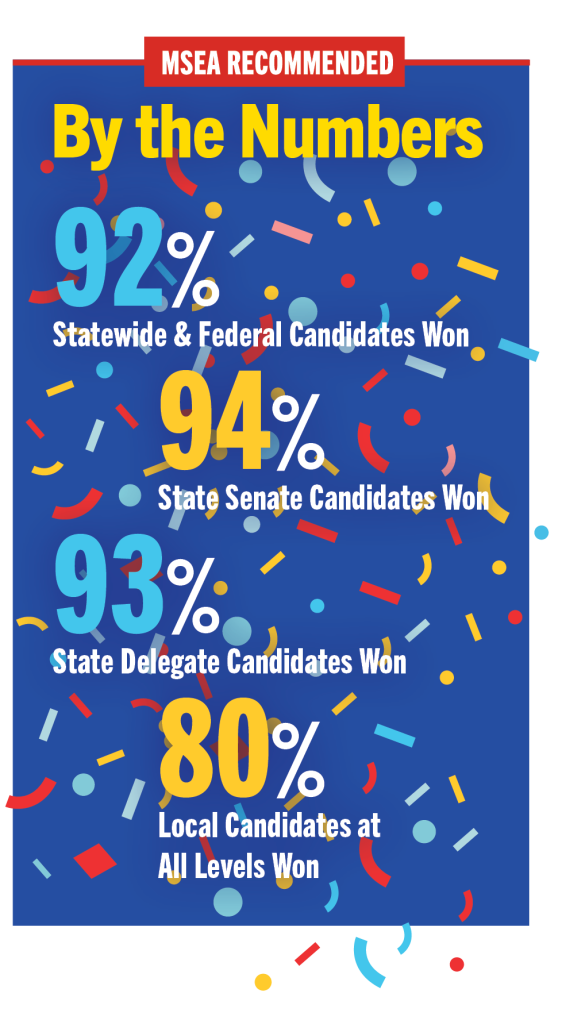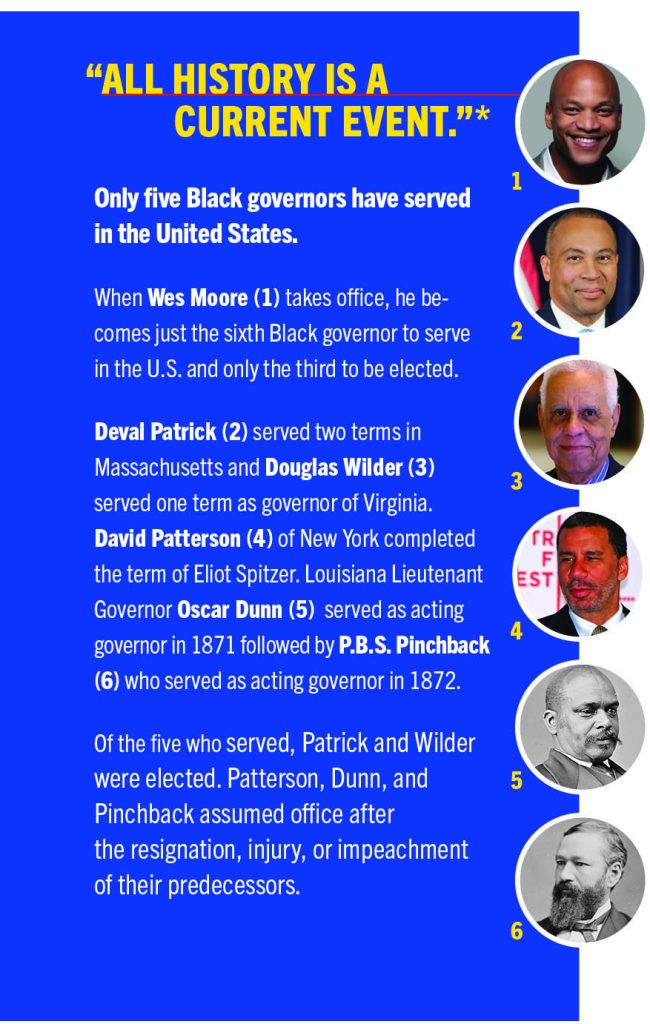Moore, Miller, Lierman, Brown Win
Big Wins for Education in General Election 2022


When MSEA delegates to the Spring Representative Assembly voted to recommend the statewide ticket of Wes Moore and Aruna Miller for governor and lieutenant governor, Brooke Lierman for comptroller, and Anthony Brown for attorney general, they knew it was a winning and historic ticket.
Each candidate is on the right side of education issues—they support an accurate and honest education for students, fair pay for all school employees, educator voice in shaping public education policy, and communities that are safe, empowered, and supported.
Moore, who beat election denier Dan Cox with more than 60% of the vote, becomes Maryland’s first Black governor and only the third Black governor ever to be elected in the country. His running mate, Aruna Miller, is the first South Asian woman elected lieutenant governor in the U.S and first immigrant to hold statewide office in Maryland. The firsts travelled down the statewide ballot, too— Brooke Lierman is the first woman comptroller in Maryland and Anthony Brown is the first Black attorney general.
In an interview with TheGrio, Moore said of his victory, “There will be a lot of 11-year-olds, who are in situations like the ones I was in, who will look at their governor and will see themselves. And I’ll see myself in them. And that’s how I plan on governing.”

On the campaign trail, Moore promised to elevate educator voices in policymaking and has already begun to do so as governor-elect by appointing MSEA President Cheryl Bost to serve on the 26-member Transition Steering Committee developing policy recommendations for the governor. “‘Nothing about us, without us’ is something we heard time and again from Wes,” said Bost, “and he’s already following through on that promise. I’m proud to lift the voice of educators on the transition team and know that we have a great opportunity to make a difference for our students, profession, and schools.” Educator voice will also come from one of Moore’s first and most critical staff appointments: his chief legislative officer will be former Montgomery County teacher, MSEA member, and state delegate Eric Luedtke.
“These statewide victories not only represent the historic shattering of glass ceilings, but an incredibly strong team who will fight alongside us for the changes and resources that our students and educators need,” said Bost. “I’m proud that our inclusive, thorough endorsement process resulted in delegates from across the state voting to support these outstanding leaders at the Spring Representative Assembly. And I’m very proud of the thousands of doors knocked, calls made, texts sent, volunteer shifts filled, and 400,000 Apple Ballots handed out by MSEA members to help educator-recommended candidates up and down the ballot win.”
Winning across the State
In many tight races across the state, pro-public education candidates pulled through against determined and often divisive challengers—some of whom posed real threats to public education.
In Frederick County, 17-year veteran educator Jessica Fitzwater, a former NEA Activist of the Year, was elected county executive. After two terms on the county council, Fitzwater knows government, knows her county, and understands what good public schools mean to the quality of life for families and communities.
“Jessica understands that public education is the bedrock of our community, but that more needs to be addressed in order for our students to reach their full potential,” said Missy Dirks, president of the Frederick County Teachers Association.
“She has worked as a member of the county council to address issues like affordable housing and economic opportunity so she will hit the ground running to make sure our schools and communities will continue to grow stronger.”

Fitzwater joins Johnny Olszewski, Jr. in Baltimore County and Marc Elrich in Montgomery County as former educators and MSEA members now heading their local governments. Educator-recommended county executive candidates Steuart Pittman (Anne Arundel) and Calvin Ball (Howard) were re-elected as well.
In the General Assembly, educator-recommended candidates recorded stunning levels of success, with more than 93% of educator-recommended Senate candidates and 92% of House of Delegates candidates emerging victorious. Thanks to these wins, pro-public education majorities will be firmly in place in both chambers of the State House for the next four years.
High Stakes School Board Races
Frederick County was one of several counties that saw slates of extremist candidates running for board of education—often backed by national organizations more focused on dividing communities than addressing the issues faced by students. But thanks to strong organizing efforts by candidates and locals, educator-recommended candidates running to protect a fair and honest education came out on top in the majority of these races.
In Frederick, three out of four educator-backed candidates defeated members of an extremist “Hate Slate” (a fourth “Hate Slate” member was defeated in the primary), and in Baltimore County educator-recommended candidates prevailed against two out of three of the far-right candidates running. Educator-recommended candidates also defeated extreme candidates in Charles, Harford, and Howard, among other counties.
“This isn’t over. We know that these extremist school board candidates will come back and continue to be funded by billionaires and animated by an extreme national agenda focused on distractions and dog whistles,” said Bost. “We will need to stay vigilant, stay organized, and make sure pro-public education school board candidates win.”
Educator Candidates Win

From Fitzwater, Olszewski, and Elrich to winning General Assembly candidates like Eric Ebersole (D-Baltimore County), educator candidates had strong showings across the state. In Harford County, kindergarten teacher Jacob Bennett flipped an important county council seat, replacing a member who supported a county budget that cut hundreds of teaching positions that left the county with the largest student-teacher ratio in the state.
“My wife Abbie and I started talking about the need to have someone run for this seat a little over two years ago,” Bennett said. “After waiting for anyone to file and run, we decided we would be that someone.” Like Fitzwater, Bennett used opportunities in his local, MSEA, and NEA to learn how to run and win a local campaign. “After filing, I went through NEA’s See Educators Run program. It was incredible, and foundational to me learning how to run the campaign. I couldn’t recommend that program enough to anyone in the union looking to take political action.”


